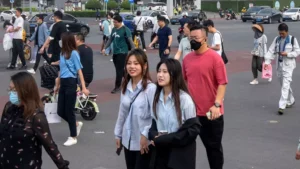In Beijing, Yang, a 27-year-old blogger, met her first client in an IKEA store. For 125 yuan ($17) per hour, she provided him company, writes Nikkei Asia.
The client, a young man, needed someone to listen to his complaints about his girlfriend.
This incident highlights a larger trend: young Chinese seeking connections amidst growing loneliness and stress.
This need has sparked a new service in China: people rent out their time for extra income.
Young professionals, facing work and personal pressures, find solace in paid companionship.

Platforms like Douyin and Xiaohongshu help individuals like Yang advertise their time.
Yang has helped seven clients, all under 35, each looking for support or someone to join them in everyday activities.
The service’s charm is its simplicity and mutual benefit. It lets people make extra money while offering clients tailored companionship, away from the expectations of friends or family.
Alaia Zhang, 22, from Guangzhou, also finds value in providing someone to talk to, especially targeting female clients for safety.
In addition, she sees this role as a step towards becoming a spiritual teacher.
Her clients, mostly shy young women, seek shared experiences or just an ear to listen, showing a universal desire for connection in today’s challenging world.
Yi Xiang, 30, a blind massage parlor owner, values the service for the social interaction it offers.
Additionally, It shows the service’s inclusiveness, even catering to those with disabilities who seek companionship and new experiences.
This trend reaches beyond China. Cindy Lu, a 31-year-old freelance photographer in Toronto, serves Chinese international students, offering them companionship and support.
Addressing the Global Demand
It shows the global need for this phenomenon.
The growth of paid companionship, including hospital companion services, indicates a societal shift.
However, this market addresses a basic human need for connection and support, filling gaps left by modern urban living and traditional social structures.
As it expands, it showcases how young people creatively navigate economic and emotional challenges, changing the dynamics of social interaction.

